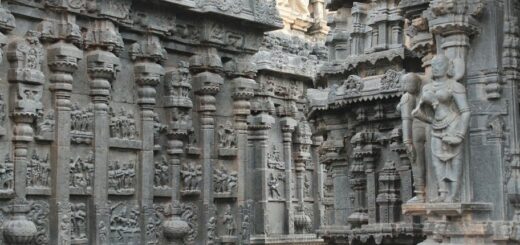Ministry of HRD
by
Mentors4ias
·
March 26, 2019
Rashtriya Uchchatar Shiksha Abhiyan (RUSA)
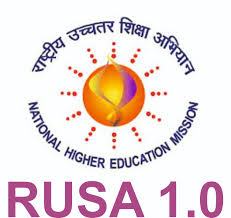
- Rashtriya Uchchatar Shiksha Abhiyan (RUSA) is a Centrally Sponsored Scheme (CSS), launched in 2013 aims at providing strategic funding to eligible state higher educational institutions.
- The central funding (in the ratio of 60:40 for general category States, 90:10 for special category states and 100% for union territories) would be norm based and outcome dependent.
- The funding would flow from the central ministry through the state governments/union territories to the State Higher Education Councils before reaching the identified institutions.
- The funding to states would be made on the basis of critical appraisal of State Higher Education Plans, which would describe each state’s strategy to address issues of equity, access and excellence in higher education.
The salient objectives of RUSA are to:
- Improve the overall quality of state institutions by ensuring conformity to prescribed norms and standards and adopt accreditation as a mandatory quality assurance framework.
- Usher transformative reforms in the state higher education system by creating a facilitating institutional structure for planning and monitoring at the state level, promoting autonomy in State Universities and improving governance in institutions.
- Ensure reforms in the affiliation, academic and examination systems.
- Ensure adequate availability of quality faculty in all higher educational institutions and ensure capacity building at all levels of employment.
- Create an enabling atmosphere in the higher educational institutions to devote themselves to research and innovations.
- Expand the institutional base by creating additional capacity in existing institutions and establishing new institutions, in order to achieve enrolment targets.
- Correct regional imbalances in access to higher education by setting up institutions in unserved & underserved areas.
- Improve equity in higher education by providing adequate opportunities of higher education to SC/STs and socially and educationally backward classes; promote inclusion of women, minorities, and differently abled persons.
Ishan Vikas and Ishan Uday schemes
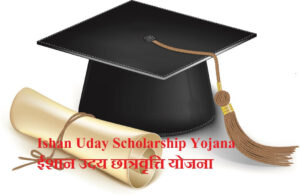
Ishan Vikas:
- coordinated by Indian Institute of Technology (IIT), Guwahati and under the programme, selected school children from North Eastern States are brought in close contact with the Indian Institute of Technology (IITs), Indian Institutes of Science Education and Research (IISERs) and National Institute of Advanced Studies (NIAS) during the vacation period to motivate them to pursue science, technology, engineering and mathematics and to facilitate internship opportunities for the engineering college students in various institutes of national importance.
Ishan Uday Scholarship Scheme:
- Administered by University Grants Commission (UGC). Under the scheme, scholarship is provided to the students having parental income upto Rs. 4.5 lakh per annum, from the North East Region for pursuing general degree, technical and professional degree courses including medical and para-medical courses.
- The target of beneficiaries under the scheme is 10,000 per year. Rate of scholarship under the scheme is, Rs. 5400/- per month for general degree course and Rs. 7800/- per month for technical/medical/professional/paramedical courses.
Shala Asmita Yojana (SAY)
- To track the educational journey of school students from Class I to Class XII across the 15 lakhs private and government schools in the country.
- ASMITA will be an online database which will carry information of student attendance and enrolment, learning outcomes, mid-day meal service and infrasstructural facilities among others. Students will be tracked through their Aadhaar numbers and incase those not having unique number will be provided.
Global Initiative of Academic Networks (GIAN)
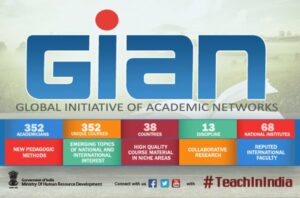
- Global Initiative of Academic Networks (GIAN) in Higher Education aimed at tapping the talent pool of scientists and entrepreneurs, internationally to encourage their engagement with the institutes of Higher Education in India so as to augment the country’s existing academic resources, accelerate the pace of quality reform, and elevate India’s scientific and technological capacity to global excellence.
GIAN is envisaged to achieve the following objectives:
- To increase the footfalls of reputed international faculty in the Indian academic institutes.
- Provide opportunity to our faculty to learn and share knowledge and teaching skills in cutting edge areas.
- To provide opportunity to our students to seek knowledge and experience from reputed International faculty.
- To create avenue for possible collaborative research with the international faculty.
- Develop high quality course material in niche areas, both through video and print that can be used by a larger body of students and teachers.
- To document and develop new pedagogic methods in emerging topics of national and international interest
Rashtriya Madhyamaik Shiksha Abhiyan (RMSA)
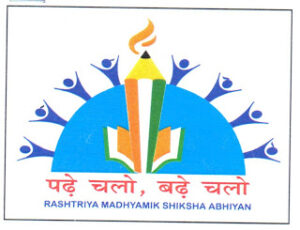
- The scheme envisages to enhance the enrolment at secondary stage by providing a secondary school within a reasonable distance of any habitation, with an aim to ensure GER of 100% by 2017, i.e., by the end of 12th Five Year Plan and achieving universal retention by 2020.
- The scheme provides financial support for additional class rooms, labs, art rooms, toilet blocks, drinking water facilities, residential hostels, appointment of additional teachers, teacher’s training etc.
- Targeted Teacher : Student ratio = 1:30
Framework:
- The scheme is being implemented by the State government societies established for implementation of the scheme.
- The central share is released to the implementing agency directly.
- The applicable State share is also released to the implementing agency by the respective State Governments.
Kasturba Gandhi Balika Vidyalaya (KGBV)
- The Kasturba Gandhi Balika Vidyalaya (KGBV) scheme was launched in July 2004,for setting up residential schools at upper primary level for girls belonging predominantly to the SC, ST, OBC and minority communities.
- The scheme is being implemented in educationally backward blocks of the country where the female rural literacy is below the national average and gender gap in literacy is above the national average.
- The scheme provides for a minimum reservation of 75% of the seats for girls belonging to SC, ST, OBC or minority communities. For the remaining 25%, priority is accorded to girls from families below poverty line.
Mid-Day Meal Scheme
- Mis day meal scheme was Started in 1995 as National Programme of Nutritional Support to Primary Education to enhance, retention and attendance and simultaneously improving nutritional levels among children.
- The scheme offers free lunches for children in primary, secondary classes in government, government aided, local body funded, selected NGOs which support government initiatives, NGO serving and training mentally and physically challenged children etc. According to estimates, around 1.2 crore children are served free lunch every day, making it a largest meals scheme in the world.
- The programme supplies free lunches on working days for children in primary and upper primary classes in government, government aided, local body, Education Guarantee Scheme, and alternate innovative education centres, Madarsa and Maqtabs supported under SSA and National Child Labour Project schools run by the ministry of labour
- MDM is covered by National Food Security Act, 2013
Sarva Shiksha Abhiyan(SSA)
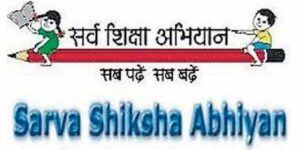
- SSA was launched in 2000.
- It seeks to achieve universal access to education and retention of students in schools.
- This is an Indian Government programme aimed at the universalisation of elementary education “in a time bound manner”, the 86th Amendment to the Constitution of India making free and compulsory education to children between the ages of 6 to 14(estimated to be 205 million children in 2001) a fundamental right.
- SSA interventions include inter alia, opening of new schools and alternate schooling facilities, construction of schools and additional classrooms, toilets and drinking water, provisioning for teachers, regular teacher in service training and academic resource support, free textbooks& uniforms and support for improving learning achievement levels / outcome.
- The expenditure on the programme was shared by the Central Government (85%) and the State Governments. The Central share was funded by a number of external agencies, including the World Bank, Department for International Development (DFID) and UNICEF.
Padhe Bharat Badhe Bharat
- Padhe Bharat Badhe Bharat is a nationwide sub-programme of Sarva Shiksha Abhiyan. Children who fail to read in early education lag behind in other subjects.
- The programme is designed to improve comprehensive early reading,writing and early mathematics programme for children in Classes I and II.
Samagra Shiksha
- Samagra Shiksha is an overarching programme for the school education sector extending from pre-school to class 12. The scheme has been prepared with the broader goal of improving school effectiveness measured in terms of equal opportunities for schooling and equitable learning outcomes.
- It subsumes the three Schemes of Sarva Shiksha Abhiyan (SSA), Rashtriya Madhyamik Shiksha Abhiyan (RMSA) and Teacher Education (TE).
The major objectives of the Scheme are
- Provision of quality education and enhancing learning outcomes of students;
- Bridging Social and Gender Gaps in School Education;
- Ensuring equity and inclusion at all levels of school education;
- Ensuring minimum standards in schooling provisions;
- Promoting Vocationalisation of education;
- Support States in implementation of Right of Children to Free and Compulsory Education (RTE) Act, 2009; and
- Strengthening and up-gradation of SCERTs/State Institutes of Education and DIET as a nodal agencies for teacher training.
Scheme for Promotion of Academic and Research Collaboration
- The Scheme for Promotion of Academic and Research Collaboration (SPARC) is a Ministry of Human Resource Development initiative that aims at improving the research ecosystem of India’s Higher Educational Institutions by facilitating academic and research collaborations between Indian Institutions and the best institutions in the world.
- Indian Institute of Technology Kharagpur is the National Coordinating Institute to implement the SPARC programme.
- This Scheme is expected to have a major impact in providing the best international expertise to address major national problems, expose Indian academicians to the best collaborators abroad, enable international faculty to stay in India for a longer duration, provide Indian students an opportunity to work in the world class laboratories, to develop strong bilateral relationships in research, and improve the international ranking of Indian Institutes.
IMPRESS Scheme
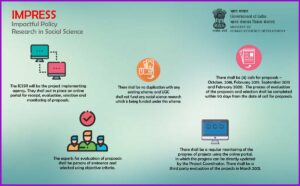
- Impactful Policy Research in Social Science (IMPRESS) aims to encourage social science research in policy relevant areas so as to provide vital inputs in policy-formulation, implementation and evaluation.
- The IMPRESS is an initiative of the Ministry of Human Resource Development, Government of India and is being implemented by the Indian Council of Social Science Research.
Objectives of the scheme include
- To identify and fund research proposals in social sciences with maximum impact on the governance and society.
- To focus research on (11) broad thematic areas such as : State and Democracy, Urban transformation, Media, Culture and Society, Employment, Skills and Rural transformation, Governance, Innovation and Public Policy, Growth, Macro-trade and Economic Policy, Agriculture and Rural Development, Health and Environment, Science and Education, Social Media and Technology, Politics, Law and Economics. The Sub-Theme areas will be decided on the basis of Expert Groups’ advice before notifying the scheme and calling for applications.
- To ensure selection of projects through a transparent, competitive process on online mode.
- To provide opportunity for social science researchers in any institution in the country, including all Universities (Central and State), private institutions with 12(B) status conferred by UGC.












